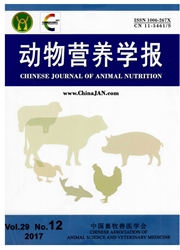

 中文摘要:
中文摘要:
本试验旨在研究发酵小麦制酒精沼渣对生长肥育猪生长性能、血清生化指标和肉品质的影响。选用128头体重为40 kg左右的"杜×长×大"杂交猪,根据性别随机分为4个组,每组4个重复,每个重复8头猪(公母各占1/2)。对照组饲喂基础饲粮,试验1、2和3组饲粮分别用5%、10%和15%发酵小麦制酒精沼渣替代基础饲粮中的部分豆粕。预试期7 d,试验期60 d,分为前期(1-30 d)和后期(31-60 d)2个阶段。结果表明:1)试验前期,各组生长肥育猪的生长性能指标均无显著差异(P〉0.05)。试验后期,试验1、2和3组的平均日增重均显著高于对照组(P〈0.05),分别增加了16.47%、25.88%和20.00%,且试验2组的平均日增重极显著高于对照组(P〈0.01);试验1、2和3组的平均日采食量均显著高于对照组(P〈0.05);而各组的料重比无显著差异(P〉0.05)。试验全期,试验2和3组的平均日增重显著高于对照组(P〈0.05)。2)饲粮中添加发酵小麦制酒精沼渣对生长肥育猪的血清谷丙转氨酶(ALT)、谷草转氨酶(AST)活性以及总蛋白(TP)、尿素氮(UN)含量均无显著影响(P〉0.05)。3)饲粮中添加发酵小麦制酒精沼渣对生长肥育猪背最长肌的p H1 h、亮度(L*)、红度(a*)、黄度(b*)、滴水损失、蒸煮损失、剪切力、硬度、弹性、内聚性、回复性以及肌内脂肪含量均无显著影响(P〉0.05)。试验1和2组背最长肌中苏氨酸、赖氨酸、脯氨酸、非必需氨基酸和总氨基酸含量显著高于对照组和试验3组(P〈0.05),试验2组的谷氨酸、试验1组的甘氨酸以及试验1和2组的丝氨酸、丙氨酸含量均显著高于对照组(P〈0.05)。饲粮中添加发酵小麦制酒精沼渣对生长肥育猪背最长肌中脂肪酸含量均无显著影响(P〉0.05)。结果提示,饲粮中添加5%和10%发酵小麦制酒精沼渣能提高生长肥育猪的平均日增重?
 英文摘要:
英文摘要:
The present study was conducted to investigate the effects of fermented biogas residue of wheat after alcohol production on growth performance, serum biochemical parameters and meat quality of growing-finish- ing pigs. One hundred and twenty-eight "DurocxLandracexYorkshire" hybrid pigs with the body weight about 40 kg were randomly allocated into four groups with four replicates per group and eight pigs per replicate by gender (males and females in half). The pigs in the control group were fed the basal diet, and those in experi- mental groups 1, 2 and 3 were fed the basal diet supplemented with 5%, 10% and 15% fermented biogas resi- due of wheat after alcohol production replacing the part of soybean meal, respectively. The pre-test lasted for 7 days, and the experiment lasted for 60 day consisting of early period from I to 30 days and later period from 31 to 60 days two periods. The results showed as follows: 1 ) there were no significant differences in growth per- formance indices of growing-finishing pigs among all groups in early period ( P〉0.05). In later period, the av- erage daily gain (ADG) in experimental groups l, 2 and 3 was significantly higher than that in the control group and increased by 16.47%, 25.88% and 20.00%, respectively (P〈0.05), and ADG in experimental group 2 was significantly higher than that in the control group (P〈0.01) ; the average daily feed intake (AD- FI) in experimental groups 1, 2 and 3 was significantly higher than that in the control group (P〈0.05) ; and the ratio of feed to gain (F/G) had no significant difference among all groups (P〉0.05). ADG in experimen- tal groups 2 and 3 was significantly higher that than in the control group in whole period (P〈0.05). 2) Dietary fermented biogas residue of wheat after alcohol production had no significant effects on the activities of alanine aminotransferase (ALT) and aspartate aminotransferase (AST) and the contents of urea nitrogen (UN) and total protein (TP?
 同期刊论文项目
同期刊论文项目
 同项目期刊论文
同项目期刊论文
 期刊信息
期刊信息
